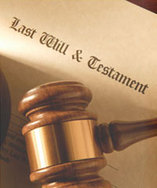Understanding Probate

The word “probate” comes from the Latin and means “to prove the will”. Probate is a legal process for distributing your estate that takes place after your death. The validity of your will is determined (if you have one), your assets are identified, your heirs are located, and your estate is distributed - after your debts, taxes, and fees are paid.
If there is a will and it names an executor, the executor will be responsible for seeing that the terms are carried out throughout the probate process. The executor must identify and inventory the assets and also have them appraised. This process can take anywhere from a few months to a year. The executor may have to sell vehicles, land, securities, artwork or other property to pay any cash bequests - or pay off any debts left by the deceased. The executor could be a relative or an unrelated person. He or she could ask the lawyer who drew up the will for help with the legal necessities of probate. The cost of the lawyer will be paid directly by the estate of the deceased.
Small estates usually go through probate in about one year, with six months generally being a minimum time if everything proceeds according to schedule and depending on your state's court system.
If the deceased did not leave a will, or if an executor is not named in the will, then the probate court will frequently assign the responsibility of handling the probate process to a relative; such as the spouse or child, or to the person who inherits the bulk of the assets of the deceased. This person is called the administrator. If a probate proceeding is not required, the court will not appoint an administrator. Instead, the family members and friends of the deceased will choose a person to serve as an informal administrator.
The probate process has several phases. The executor or administrator must prove the validity of the will and deliver it to the local probate court. The will can be validated with a written statement made under oath by the two witnesses to the creation of the will. The executor or administrator must also present the court with information on all of the property and debts of the deceased and the beneficiaries. Then creditors are informed of the death of the deceased. Creditors usually have six months from the notification of the probate to collect any money that is owed to them.
They must recover the money from the estate and not the heirs. The estate tries to settle these debts out of the available assets. If any assets are left, they are distributed to the beneficiaries. If all of the debts cannot be paid off, then the court decides how to use the available assets to pay off the debts. The heirs are not legally obligated to pay off any remaining debts of the estate. If the deceased did not leave a will, the state laws will decide how the available assets are distributed to relatives. The heirs and the beneficiaries are also notified about the probate proceeding. This is the time when objections to the will are usually made. The objections can be due to accusations that the will was drawn up while the deceased was mentally unstable, or that the will is a forgery.
There are situations where probate is not a necessary action. One situation is when the deceased leaves behind very few possessions which can be distributed to beneficiaries without any judiciary supervision. If there is any money account or property that is jointly owned, then the remaining co-owner will get the money account or property by default.
If there is a will and it names an executor, the executor will be responsible for seeing that the terms are carried out throughout the probate process. The executor must identify and inventory the assets and also have them appraised. This process can take anywhere from a few months to a year. The executor may have to sell vehicles, land, securities, artwork or other property to pay any cash bequests - or pay off any debts left by the deceased. The executor could be a relative or an unrelated person. He or she could ask the lawyer who drew up the will for help with the legal necessities of probate. The cost of the lawyer will be paid directly by the estate of the deceased.
Small estates usually go through probate in about one year, with six months generally being a minimum time if everything proceeds according to schedule and depending on your state's court system.
If the deceased did not leave a will, or if an executor is not named in the will, then the probate court will frequently assign the responsibility of handling the probate process to a relative; such as the spouse or child, or to the person who inherits the bulk of the assets of the deceased. This person is called the administrator. If a probate proceeding is not required, the court will not appoint an administrator. Instead, the family members and friends of the deceased will choose a person to serve as an informal administrator.
The probate process has several phases. The executor or administrator must prove the validity of the will and deliver it to the local probate court. The will can be validated with a written statement made under oath by the two witnesses to the creation of the will. The executor or administrator must also present the court with information on all of the property and debts of the deceased and the beneficiaries. Then creditors are informed of the death of the deceased. Creditors usually have six months from the notification of the probate to collect any money that is owed to them.
They must recover the money from the estate and not the heirs. The estate tries to settle these debts out of the available assets. If any assets are left, they are distributed to the beneficiaries. If all of the debts cannot be paid off, then the court decides how to use the available assets to pay off the debts. The heirs are not legally obligated to pay off any remaining debts of the estate. If the deceased did not leave a will, the state laws will decide how the available assets are distributed to relatives. The heirs and the beneficiaries are also notified about the probate proceeding. This is the time when objections to the will are usually made. The objections can be due to accusations that the will was drawn up while the deceased was mentally unstable, or that the will is a forgery.
There are situations where probate is not a necessary action. One situation is when the deceased leaves behind very few possessions which can be distributed to beneficiaries without any judiciary supervision. If there is any money account or property that is jointly owned, then the remaining co-owner will get the money account or property by default.

